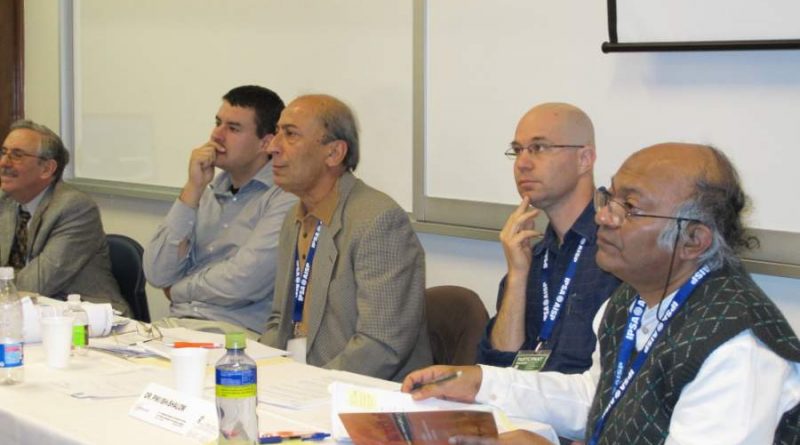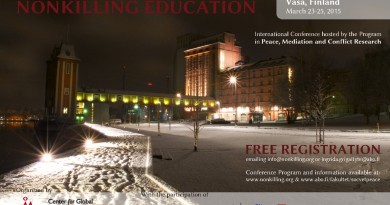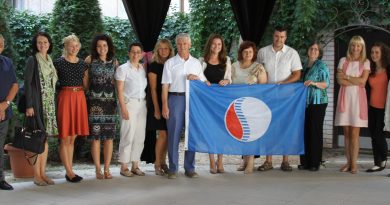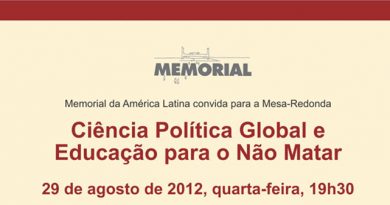Nonkilling at World Political Science Congress in Chile
The Center for Global Nonkilling supported a panel on “Nonkilling Political Science: Critical Evaluation” at the 21st World Congress of Political Science, hosted by the International Political Science Association (IPSA) in Santiago de Chile, July 12-16, 2009. The purpose of the Panel was to engage the international political science profession in serious consideration of the thesis that political science researchers, teachers, and consultants can assist change toward the measurable goal of a killing-free world. The panel follows up on the Congress’ main theme “Global Discontent? Dilemmas of Change”.
The convenor of this initiative is Professor John Trent (University of Ottawa), Chair of the IPSA Research Committee RC33 on “The Study of Political Science as a Discipline” and former Secretary-General of IPSA. Dr. Balwant (Bill) Bhaneja, that was also Co-Chair of the First Global Nonkilling Leadership Forum (2007), acted as Panel Chair and discussant.
Panel participants included Dr. Chaiwat Satha-Anand (Thammasat University and CGNK), Dr. Piki Ish-Shalom (Hebrew University of Jerusalem), Dr. Yoon-Jae Chung (President-elect, Korean Political Science Association, Korean translator of Nonkilling Global Political Science; who sent his paper but was not able to attend) and Joám Evans Pim (University of Santiago de Compostela and CGNK). Prof. Michael Stein (University of Toronto) also acted as Panel discussant.
The panel was attended by some 20 academics from various countries including political scientists from South Africa (Johannesburg), United Kingdom (Oxford), and Belgium (Flemish Institute of Peace) who along with discussants made active interventions seeking clarifications from the authors on a varied range of points.
The International Political Science Association has a membership of 3600 political scientists and 50 political science associations. Participation in the Congress with over 2500 attendants provided an excellent venue for informing the IPSA membership in and those on distribution of the congress documentation about the Nonkilling Political Science concept and CGNK’s website and projects and research committees listed therein.
RC33. 387 Nonkilling Political Science: A Critical Evaluation
Tuesday, 14 July: 900 -10.55
# 3,813 Interdisciplinary Perspectives Towards a Nonkilling Paradigm
*Evans Pim, Joám – Center for Global Nonkilling
Nonkilling, as presented by Paige (2002; 2009), refers to a form of society where killing, threats to kill and conditions conductive to killing are absent. This framework describes a deep transformation away from long held societal premises and presumptions rooted in the widespread acceptance of lethality (in all of its forms), and a refutation of mainstream killing-accepting science, in all disciplines from the biological sciences to the social sciences. Nonkilling proposes a complete paradigm shift (following Kuhn, 1962), with new principles, new language, new values, new methodological criteria, and a set of new tools for analysis of problems. This paper describes this new perspective and the basis for this normative and empirical shift of paradigm.
# 3,858 Nonkilling Political Science in the Killing Fields of International Relations
*Ish-shalom, Piki – Hebrew University of Jerusalem, Israel
It is a philosophical truism that, during a conflict, neutrality works in favour of the most powerful party. I will argue that, though praiseworthy and well-intended, the unwavering commitment of Glenn Paige to non-killing political science exposes him to an analogous criticism to the effect that non-killing, under certain circumstances (quite common in international relations), may work in favour of those who are willing to kill. A more nuanced and pragmatic commitment to non-killing is needed to face the “killing fields of international Relations.”
# 3,930 Nonkilling Political Science and Democratic Leadership
*Chung, Yoon-Jae – The Academy of Korean Studies, Republic of Korea
Nonkilling political science posits that a nonkilling society is possible and attempts to find ideas and strategies useful for minimizing or eliminating killing, or any source of killing, in human society. From a theoretical perspective, the Korean experience of democratization will be critically reviewed, focusing on three Presidential leadership initiatives intended to challenge sources of killing, be they economic, structural or external. President Park Chung Hee fought against poverty as “violence.” President Kim Young Sam dissolved the “ hanahoe,” a private unlawful faction within the army. And President Kim Dae Jung dared to push his “sunshine policy” for peaceful North-South relations on the peninsula. This paper will also examine the need to prevent “branding violence,” and the Korean experience of democratic leadership will be evaluated from the NKPS perspective.
# 4,003 Violence as Anti-Politics: A Political Philosophy Perspective
*Satha-Anand, Chaiwat – Thammasat University and Center for Global Nonkilling
Half a century ago, philosopher Hannah Arendt made a distinction between power and violence. Using her idea as a point of departure, this paper argues that the notion of “political violence” is a contradiction in terms because violence “kills” politics. The paper begins with a discussion in the use of the term “political violence” in political science. What does violence do to politics, with some critique of Slovoj Zizek’s current understanding of the notion of violence? It then concludes with a re-reading of Thucydides Melian Dialogue, generally considered the pillar of realist politics, as an attempt to elucidate how violence could “kill” politics.




